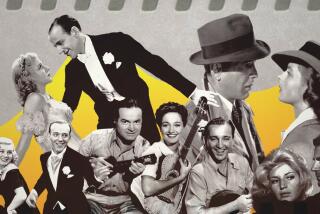PAY-CABLE SERVICES TRY A ‘VCR-FRIENDLY’ TACK
- Share via
If you own a home videocassette recorder, pay-cable services such as Home Box Office and Showtime/The Movie Channel have a new message for you: Cable and VCRs go together like popcorn and butter, and they want you to sign up for their services now!
That approach is the latest salvo in the continuing battle between cable services and video stores over how to divide the $12-billion home-entertainment pie. And it’s a battle so fierce that pay-cable is willing to throw a pie right in the face of the major motion picture studios, which supply them with movies and consider video copying a heinous crime.
The latest skirmish came this week with The Movie Channel’s announcement of a new “VCR Theater” to be offered to subscribers as part of their monthly service beginning in June. The 3 a.m. film presentation, with a new title offered daily, will be aimed at viewers who can videotape while asleep and watch whenever they choose.
In case the program’s title is lost on viewers, on-air hosts will encourage them “to take advantage of this unique taping opportunity,” press materials from The Movie Channel state.
“VCR-friendly” has become the buzz-phrase of an industry that once shunned videotapers as enemies fueling the competition from home video. Pay-cable has adopted an “if you can’t beat them, join them” mentality, according to industry analyst Paul Kagan.
HBO also will soon go public extolling the virtues of the VCR. It is already providing cable operators with marketing materials advising consumers that a cable movie channel can enhance enjoyment of their VCR by providing them with more material to tape.
But the studios still consider video copying of their movies a potentially criminal action, one that threatens to diminish the hefty revenues they earn on the sale of home videocassettes. Widespread as video-copying off the tube might be, it has never been so overtly encouraged by pay-cable operators.
Predictably, Jack Valenti, president of the Motion Picture Assn. of America, expressed “outrage that a really first-class superior organization like Showtime would be indulging in this.”
“We have one principle,” Valenti, speaking on behalf of the movie studios, told The Times. “We don’t believe anybody ought to copy our material without our consent or without paying for it. Period.”
Pay-cable executives see it differently.
“Over the past six to nine months there have been significant advances in recognizing that people tape” pay-cable movies, said Peter Chernin, executive vice president for programming and marketing for Showtime/The Movie Channel. “Our sense is let’s not be coy about it.”
Chernin believes that one longstanding stumbling block for VCR owners who are potential cable subscribers is that the standard cable hookup makes it impossible to watch one channel while taping another. “VCR Theater” will address that issue, Chernin said, because it will be televised when most viewers would not want to watch a second station anyway. Another plus: the ability to tape a new title every day at the same time “is easier than having to go through a (program) guide,” he added.
Cable operators likewise are emphasizing how well cable complements the videotape life style. Marc Nathanson, owner of Pasadena-based Falcon Cable, said that his installers now answer questions about hooking up VCRs and, in some cases, offer channel boxes that allow simultaneous taping and viewing. “What we are trying to say is that technologically we are compatible rather than making cable a pain in the neck for VCR owners,” Nathanson said.
To the movie studios, however, there are two larger issues:
--Is taping off a cable channel illegal?
--Will the practice reduce the studios’ take from the lucrative home video market?
Valenti offers a resounding “ Yes “ to both those questions.
“The fact is, the Supreme Court has never ruled about the legality of taping off of pay services,” he said, referring to the so-called Betamax Decision of 1984, in which the high court ruled only that home taping off commercial television was legal. “Many copyright people strenuously and passionately believe (pay-cable taping) is illegal and violates the Copyright Act.”
(Charles Firestone, director of the Communications Law Program at the UCLA School of Law, suggested that the legality of pay-cable taping “is something that’s not clear” and won’t be until a Betamax II court case tests the pay-cable taping issue.
On the purely business side of things, Valenti contends that “it could hurt home video. I don’t know how many copies (an individual) makes” of each film. There are, he noted, 29 million homes with VCRs, and 600,000 of them have more than one machine--meaning their owners have the ability to make unlimited duplicates.
Again, the pay-cable industry takes a different view.
“There’s no way to give us the movies and have the subscribers not have the right to tape them,” said Michael Fuchs, chairman and chief executive officer of HBO. “HBO spends more money in the motion-picture industry than any company in the world. Quite honestly, I don’t need Jack Valenti telling me how to promote my business.”
Said Showtime/The Movie Channel’s Chernin, another large customer of Hollywood fare: “The studios have a very significant investment in the success of our business. Anything that allows us to gain subscribers is in their best interest.”
In separate interviews, Fuchs and Chernin each noted that the studios make their movies available in videocassette form months before they can be seen on pay-cable--precisely to protect the lucrative home-video market.
“I think Hollywood is doing a great job getting mileage from both those sources,” added Kagan, a widely consulted industry analyst based in Carmel.
Little of this controversy would exist were it not for pay cable’s very sudden and very vocal friendliness toward the VCR owner. Why the sudden change of heart?
“They saw that VCRs were impinging on their subscriptions, so they had to make a decision: Do you try to beat them or join them?” Kagan said. “There’s a trade-off. The VCR hurts you in that it takes away some of your pay subscriptions. But it helps you in that a VCR owner wants to have cable channels he can make tapes from.”
“What we should be saying to people,” said cable operator Nathanson, “is, you’ve got a VCR, you’re spending a lot of money on your home entertainment center. What could be more natural than 54 cable channels?”
More to Read
The biggest entertainment stories
Get our big stories about Hollywood, film, television, music, arts, culture and more right in your inbox as soon as they publish.
You may occasionally receive promotional content from the Los Angeles Times.










